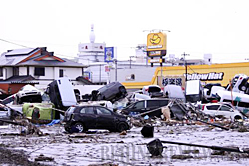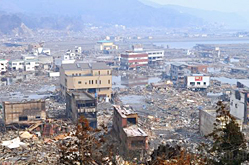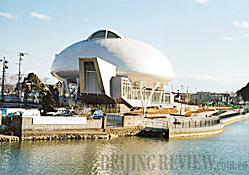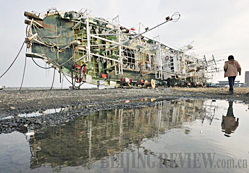|
 |
 |
|
DEVASTATED: Sendai after the earthquake (CHEN JIANLI) |
BLEAK PANORAMA: Tsunami-ravaged Iwate Prefecture on March 14 (XINHUA/KYODO) |
Earthquake, tsunami, nuclear plant breakdown. Each is a major catastrophe. But Japan has been hit by all of them. Homelessness, economic losses, release of radiation. Each is a huge challenge. Now Japan must face all three. How will Japan respond to the domino-like disaster unleashed on March 11? Is this the beginning of a major decline for Japan?
National character
As of March 25, the death toll for Japan's record-breaking 9.0-magnitude earthquake was 10,035, with 17,443 still missing, said Japan's National Police Agency. Ominously, four of the six reactors at the Fukushima nuclear power plant were in danger of releasing massive amounts of radiation due to a breakdown in the plant's cooling system. Despite the grave situation, however, the Japanese people remained calm. Even people directly affected by the disaster remained orderly instead of panicky.
When the earthquake hit on March 11, Sakumi Tsuchiya was working at a food company in downtown Tokyo. She spent three hours walking about 12 km back home. "There were many people waiting in line to use a restroom in a supermarket on my way home. We have been taught to do everything in an orderly way since childhood," she said. "Cutting in line will cause inconvenience to others."
 |
 |
|
STUNNING: Sendai before the March 11 earthquake (CFP) |
TSUNAMI CASUALTY: A fishing boat destroyed by the tsunami lies on its side in Hachinohe, Aomori Prefecture, on March 13 (XINHUA/REUTERS) |
Many people in Tokyo had to walk home that day. They walked in groups and took care of each other. "We could feel the mutual care and comfort. A stranger even handed us candies," Tsuchiya said.
These aspects of the Japanese character are one of the reasons why many observers are confident Japan will recover soon from this disaster. "The behavior of Japanese people shows a strong sense of social morality," said Feng Zhaokui, a research fellow for Japan studies with the Chinese Academy of Social Sciences (CASS).
The Tokyo Electric Power Co. withdrew about 750 employees after Unit 2 of the Fukushima nuclear power plant exploded, leaving only 50 emergency workers. These employees, dubbed the "Fukushima 50 warriors," risked their lives to prevent a complete meltdown at the plant. "Seeing the 50 workers' heroic spirit, I believe Japan can rise from this terrible disaster. The country will be able to reconstruct its economic and social life," said Feng.
Huang Dahui, Director of the Center for East Asian Research at Renmin University of China, said a major emergency like the recent earthquake in Japan can test a country's national character. Orderliness and social morality are two outstanding Japanese traits that have been displayed in the current disaster. "These are worth learning," she said.
| 